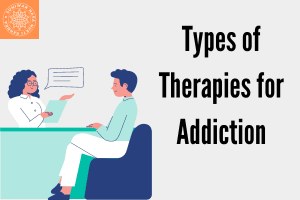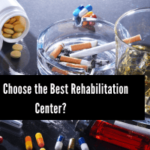Addiction is a complex and challenging condition having a significant impact on an individual’s physical, mental, and emotional well-being.
There are several types of therapies available to treat addiction, each with a different aspect to address different condition.
From behavioral therapies to Types of Recreational Therapies, alone or in combination to help individuals overcome addiction and maintain long-term recovery.
Thus in this response, we will explore What Therapy Is Used For Addiction treatment.
Different Types of Therapies for Addiction
There are several types of therapies available for Alternative Models of Addiction, each with its own approach and benefits. Some of the most commonly used therapies include:
#1. Cognitive Behavioral Therapy (CBT)
Cognitive Behavioral Therapy (CBT) is a form of psychotherapy that focuses on the relationship between a person’s thoughts, feelings, and behaviors.
Overall CBT is a highly effective form of therapy that has been extensively researched and shown to be effective for a wide range of mental health conditions.
#2. Dialectical Behavior Therapy (DBT)
These Types of Treatments for Substance Abuse focus on teaching coping skills and emotional regulation to individuals who struggle with addiction.
It is done in a group setting, but individual therapy is also available. DBT has been shown to be effective in reducing self-harm behaviors, suicidal ideation, and other symptoms of BPD.
#3. Motivational Interviewing (MI)
MI is a type of therapy that helps individuals resolve their ambivalence about changing their behavior by exploring their motivations and reasons for wanting to change.
Overall it is often use in combination with other therapeutic approaches, such as cognitive-behavioral therapy (CBT) or medication-assisted treatment (MAT), to provide a more comprehensive and effective treatment approach.
#4. Contingency Management (CM)
CM is a type of therapy that use positive reinforcement to encourage individuals to engage in behaviors that support their recovery from addiction.
In CM, individuals get rewards or incentives for engaging in positive behaviors like; attending treatment sessions, abstaining from drug or alcohol use, and complying with medication regimens.
Thus you must also read factors to check before choosing the Best De-addiction Center in Patna…
#5. Family Therapy
This therapy involves working with the family members of an individual with addiction to address issues related to addiction and support the individual’s recovery.
Further it can help to address a wide range of issues, including marital conflicts, parent-child conflicts, sibling rivalry, communication problems, behavioral problems in children, and issues related to addiction, mental illness, and trauma.
#6. Group Therapy
Group therapy involves individuals with addiction coming together to support each other and work through their issues in a group setting.
It is an effective form of treatment for many people. In fact it can be beneficial when used in conjunction with other forms of therapy, such as individual counseling or medication.
#7. Medication-Assisted Treatment (MAT)
MAT involves using medications to help individuals manage their cravings and withdrawal symptoms as they work through their addiction.
Further the medications use in MAT are FDA-approved and help to reduce withdrawal symptoms and cravings, making it easier for individuals to remain sober and engaged in their recovery.
However it’s important to note that different types of therapy are more effective for different individuals, and a combination of therapy for comprehensive treatment.
It’s also important to work with a qualified healthcare professional to determine the Best Types of Therapy for Addiction for your specific needs.
Conclusion
In conclusion, there are various Types of Addiction Treatment, each with its own unique approach and benefits.
These include behavioural therapies like CBT, contingency management, and motivational interviewing, as well as alternative therapies like art therapy and equine therapy.
Additionally, medication-assisted treatment, support groups, and holistic therapies can also play an important role in addiction recovery.
The most effective treatment approach will depend on the individual’s specific needs and circumstances. And it’s important to seek the guidance of a qualified healthcare professional to determine the best course of action.
Sumiwar Nasha Mukti Kendra offers the best addiction treatment facilities with 96% of success rate. Thus don’t think much get an consultation with Best Nasha Mukti Kendra Patna and have the right treatment plan and support.
FAQs
Here are the answers of some of your most frequently asked questions related to types of therapies for addiction
Q: How Long Does Addiction Treatment Take?
The duration of addiction treatment can vary depending on several factors, including the severity, type of the addiction, individual’s response to treatment, and the treatment setting.
In general, addiction treatment can range from a few weeks to several months or even years.
Q: Is Medication-Assisted Treatment Effective For Addiction?
Yes, Medication-Assisted Treatment (MAT) is generally consider as an effective approach for treating addiction. MAT involves using medications in combination with behavioral therapies to treat substance use disorders.
For example, medications such as methadone, buprenorphine, and naltrexone are effective in treating opioid addiction.
Q: Is Inpatient Or Outpatient Rehabilitation Better For Addiction Treatment?
The best type of addiction treatment depends on the individual’s needs and the severity of their addiction.
Inpatient rehabilitation may be more appropriate for individuals with severe addiction or those who need a higher level of support.
Further outpatient rehabilitation is a better fit for those with milder addiction or more stable support systems at home.
Q: Can I Still Work or Go to College While Receiving Addiction Treatment?
Yes, it is often possible to continue working or attending school while receiving Types of Addiction Treatment, particularly with outpatient rehabilitation programs.
However, it is important to prioritize treatment and make necessary adjustments to daily routines to ensure the best chance of success in recovery.
Q: What Happens After Addiction Treatment Is Complete?
After completing addiction treatment, ongoing support and maintenance are essential for long-term recovery.
This include participation in support groups, continuing therapy, and practicing self-care and stress management techniques.



